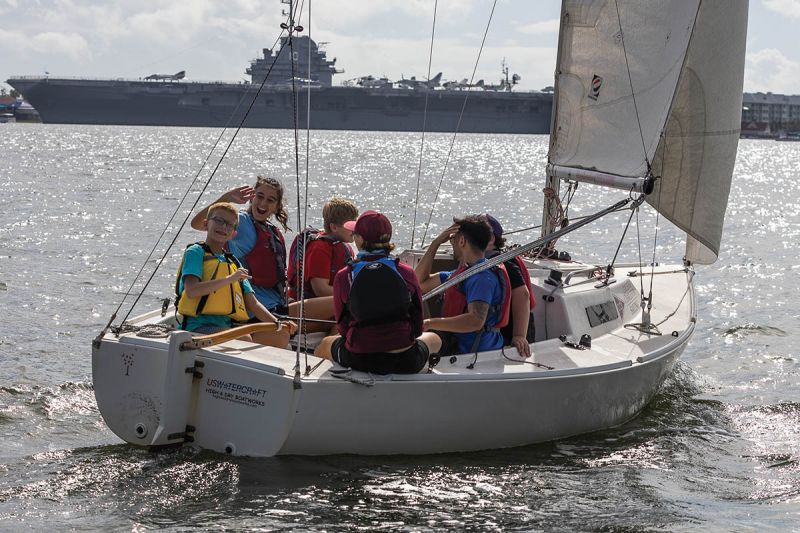The Charleston-based national nonprofit holds its local camp this month

“What do you call a pessimistic seabird? A pelican’t.” Scott Herman’s joke elicits a wave of playful boos from the tweens and teens gathered inside the dock house. After that icebreaker, the Spectrum Sailing founder conducts the morning meeting, including a group activity, knot demonstration, and weather update. The kids and instructors then move through a bathroom-sunscreen-water bottle-life jacket check before shoving off for two hours on the water. The scene could be plucked from any sailing program, but something unique is afloat here.
As the only national inclusive sailing program for autistic youth, Spectrum Sailing has introduced more than 700 neurodivergent kids to the sport through free, three-day camps. With Herman at the helm, volunteer instructors operate morning and afternoon sessions, teaching sailing basics to 10 participants at a time. Host clubs, including the College of Charleston, provide access to keel boats and facilities across eight states, and the in-demand sessions draw families from near and far. From February through October, Spectrum Sailing operates a dozen camps, each with an operating cost of about $19,000. The nonprofit functions with aid from individual and corporate donors, community grants, and connections inside the tight-knit autism and sailing networks. Such nationwide partnerships now provide tailwinds for the nonprofit, which began with the resolute father testing the waters.
Launched by Scott Herman, Spectrum Sailing introduces neurodivergent children to the sport through free, three-day camps. The final camp of the season is held in Charleston on October 3-5.
Upon moving to Charleston in 2017, Herman, a lifelong sailor, wanted his sons to learn to sail, but none of the area clubs could support his then 10-year-old son, Daniel, who has autism. Using nonprofit Surfers’ Healing as a model, he organized a free session, with a handful of spots to be filled via lottery—70 applications rolled in. In the wake of such demand, he repeated the plan several times, until a fortuitous request changed his tack.
The call came in 2022 from a Chicago club asking Herman to bring his program north. “I’m just a dad, not an instructor or specialist with letters after my name,” says Herman, who realized he needed to chart a more structured course (including insurance, branding, manpower, and funding). With that, Spectrum Sailing officially launched.
Since then, the program has introduced a fleet of changes within the autism community: professional development for more than 400 sailing instructors and volunteers, neurodiversity initiatives within global sail racing leagues, and an impact study through George Washington University. Because drowning is the number one cause of death in autistic youth, the nonprofit also released an exclusive water safety program developed with Aspiritech, a tech company that employs a neurodiverse staff. “This is training built by autistic adults for autistic kids,” says Herman. And expansion is on the horizon with Next Tack, an eight-week program teaming campers with neurotypical high schoolers for private coaching and competitive racing.
Perhaps the greatest result of Spectrum Sailing, though, is the enduring feeling of being part of the crew. Campers often swap phone numbers, proud to have truly made a friend. “Raising an autistic child is a lonely road—you’re not cheering from the sidelines with other soccer moms and dads or bringing your kid to parties,” says Herman. So he’s thrilled to watch parents and caregivers exchange advice and build a village while their children soak up camp.
“Spectrum Sailing launched with the official mission to provide maritime education, programming, and outreach for autistic individuals, but really, sailing is merely a vehicle for these kids to feel included, build self-esteem, and hone social-emotional skills,” explains Herman. He chokes up recalling a 12-year-old who gained enough confidence at camp to finally tackle riding a bike, something his own son once struggled to learn. “The real value is found in successes outside camp. I honestly don’t care if they remember port and starboard.”